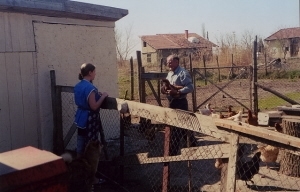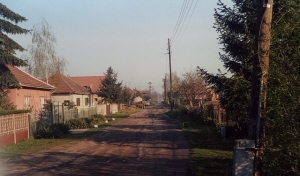 |
| Vilmos in his yard |
My hero does not have the ordinary amenities that the average person takes for granted. He is poor and lives on a dirt road in a rural town in Serbia called Subotica. He hunts for his dinner every night. The buildings in town resemble swiss cheese, there are holes in the walls cut out by American precision missiles. The animals in the zoo just down the road look like skeletons from the nearby graveyard. This hero certainly did not get any fanfare, let alone a simple recognition, that a hero would deserve. He has no plaque of remembrance; he has no statue in his honor. So, this story is my ode and my way of rightfully recognizing a true hero.
My hero's name is Vilmos Farkas. I never would have known that Vilmos was a hero. I met him while I was traveling with my family in Hungary, accompanied by his daughter. He is not particularly out of the ordinary. Not more than five people in the United States would know his name. He is not a saint, or revolutionary leader, and on the surface does not appear to be someone who was willing to sacrifice his life for the good of others. But then we traveled with him to Belgrade; and once there, we met a man in his twenties, wearing well-cut trousers and a brown sweater. When he saw Vilmos, he ran up to him, embraced him in the center of the busy city street, and kissed him repetitively on the cheek. The man in the brown sweater was not aware of the people around him; only of his deep admiration and appreciation for Vilmos. Later when we asked Vilmos' daughter why the young man seemed so close to Vilmos, she told us this story.
 |
| Vimos' village |
In 1998 Yugoslavia was breaking up because the many ethnic groups that were grouped together under communism no longer wanted to be together. The country began to split according to traditional ethnic lines; and violence resulted from the long standing hatreds. Vilmos lived in Serbia, but he was Hungarian. Part of his family had married Serbians. These Serbian relatives had mostly fled to Serbia, but his parents stayed in Mostar, which was in Bosnia Herzegovina, the country in which they had lived all their lives.Croatian nationalists were intent on ridding the city of all Serbians, sending them to exile, robbing them, or more often, murdering them. The old couple had many friends and believed that their friends would never turn their backs on them; however, one of their neighbors eventually betrayed them and the Croatian nationalists kidnapped them for ransom money. The nationalists would call the couple's children on the phone and torture the couple at the same time, so all that the children could hear were screams, tears and pleas for help. The Croatian nationalists would then tell the children that if they did not give them ransom money, they would kill their parents.
This torture continued for months. Another Serbian could not safely enter Bosnia Herzegovina, so the children asked for help from the ethnic Hungarian Vilmos, and he accepted their request. He could not drive directly through Yugoslavia because of the conflict, so he drove all the way though Hungary, bribing the officials at the border to let him through and not check the contents of his bags. Once in Croatia, he left his car and his papers, as requested by the Nationalists, and continued on. He walked over a hundred kilometers through the countryside of Bosnia Herzegovina, trying to avoid meeting Croatians. He could have been killed or attacked at anytime by a bandit wanting the large sum of money that he was carrying.
Vilmos had no guarantee that the kidnappers would not kill him as well when he arrived to meet them with the money. Because his papers were at the border, and no one knew that he was in Bosnia Herzegovina, he could have lay hurt or dead in the countryside for weeks before someone found him. The Nationalists did not kill the old couple and the kidnappers released them, as promised, and Vilmos walked back through the desert with them. This was more dangerous than his initial journey; now the Serbians would defiantly kill him since he was with two Croatians in Bosnia Herzegovina. Miraculously, they were not harmed, and Vilmos returned the old couple to their children, asking for no recognition or money for his help.
The man in the brown sweater was their son.
It is for his extreme heroism that I want to honor Vilmos in this way. He sacrificed his personal safety, not for love or money, but simply out of kindness toward a distant friend. And he asked for nothing in return, the ultimate example of selflessness. Although you did not know his name before you came to this site, I hope you will remember it and remember that there are many heroes, who, despite being largely unrecognized, have made a huge impact in someone's life out of the kindness and generosity in their heart.
Page created on 1/11/2007 12:00:00 AM
Last edited 1/6/2017 6:19:47 PM
